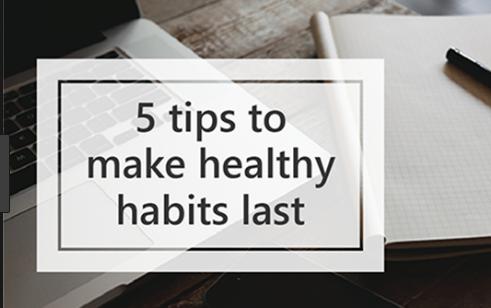As one year gives way to the next (making reflecting back practically unavoidable), one of the things I'm grateful for is the volume of health information that comes across my desk. Not only is it interesting to read, but it's quite practical, too, since I can incorporate some of the things I learn into my daily or weekly routine.
In reviewing the topics I wrote about in 2017, I settled on five that were worth embracing – and I feel healthier as a result. So here they are, along with a brief description of why they spoke to me. And if you'd like to read more about any of them, for added detail and context, the link to the article itself is included.
MAKE SLEEP A PRIORITY
 If it all possible, adults should get 7 to 9 hours of sleep every night. It makes you more alert the next day, and the sleep itself helps one to be healthier and better able to ward off illnesses.
If it all possible, adults should get 7 to 9 hours of sleep every night. It makes you more alert the next day, and the sleep itself helps one to be healthier and better able to ward off illnesses.
"I used to suggest that sleep is the third pillar of good health, along with diet and exercise," said neuroscience and psychology Prof. Matthew P. Walker, who teaches at the University of California, Berkeley. "But I don't agree with that anymore. Sleep is the single most effective thing you can do to reset your brain and body for health."
DRINK COFFEE
A recent study based on data collected from over 200 meta-analyses concluded that moderate, daily coffee drinking provided many health benefits and that any shortcomings from consumption were outweighed by the positive effects.
"The researchers found that drinking three cups of coffee a day was associated with the greatest benefit in terms of cardiovascular disease, coronary heart disease, and stroke, when compared with not drinking coffee," according to an article in the British Medical Journal on a study conducted late in 2017. "Consumption at this level was associated with a 19% lower risk of mortality from cardiovascular disease ... a 16% lower risk of mortality from coronary heart disease ... and a 30% lower risk of stroke mortality."
MEN, GO ENJOY SAUNAS
 As a way of improving your health, could this be easier? So if you're not already a member of a health club and you're thinking about joining one in 2018, consider this: frequent – even daily – sauna bathing cuts the risk of elevated blood pressure nearly 50 percent, as compared to those who went just once a week.
As a way of improving your health, could this be easier? So if you're not already a member of a health club and you're thinking about joining one in 2018, consider this: frequent – even daily – sauna bathing cuts the risk of elevated blood pressure nearly 50 percent, as compared to those who went just once a week.
Saunas "may decrease systemic blood pressure through different biological mechanisms," the authors of a study conducted in the fall, wrote in a statement. "During sauna bathing, the body temperature may rise up to 2 °C degrees, causing vessels vasodilation. Regular sauna bathing improves endothelial function, i.e. the function of the inside layer of blood vessels, which has beneficial effects on systemic blood pressure. Sweating, in turn, removes fluid from the body, which is a contributing factor to decreased blood pressure levels."
ADD A KETTLEBELL TO YOUR WORKOUT
 Never heard of it? Well now you have, and it's worth your while to use this exercise weight when you workout. (You do workout, right?) Here's just one of the benefits of doing so:
Never heard of it? Well now you have, and it's worth your while to use this exercise weight when you workout. (You do workout, right?) Here's just one of the benefits of doing so:
"[T]he average study participant burned approximately 20 calories per minute during a typical kettlebell workout," according to the American Council on Exercise, which wrote about a study focusing on the weight. "This equates to an astounding 400 calories during a 20-minute workout. In terms of calorie burning, these results are equivalent to running a six-minute mile pace, or cross-country skiing uphill at a fast pace."
DRINK BLACK TEA, FOR ITS WEIGHT-LOSS BENEFITS
 If coffee isn't your cup of tea, that how about this cup? Keep this worthwhile nugget of knowledge top of mind when you're looking for a hot beverage to warm you up this winter (and beyond).
If coffee isn't your cup of tea, that how about this cup? Keep this worthwhile nugget of knowledge top of mind when you're looking for a hot beverage to warm you up this winter (and beyond).
“[B]lack tea, through a specific mechanism through the gut microbiome, may also contribute to good health and weight loss in humans,” said lead author Susanne Henning, an adjunct professor at the UCLA Center for Human Nutrition, who conducted a study that was released in the fall. “The results suggest that both green and black teas are prebiotics, substances that induce the growth of good microorganisms that contribute to a person’s well-being.”




